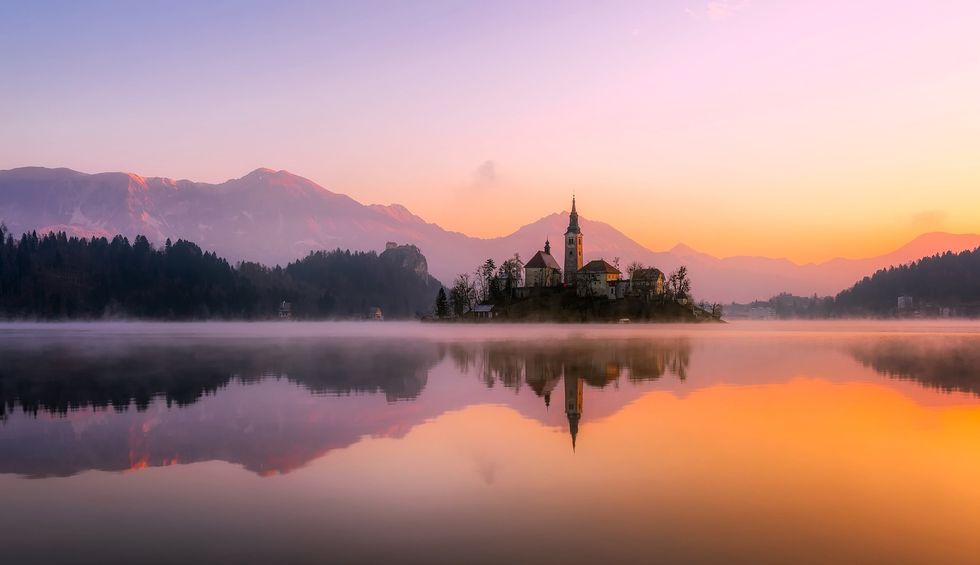Over the past week, I've been slowly studying the opening chapter to the Hebrew Bible: Genesis 1. It's a famous story, where a powerful, spiritual being transforms a chaotic wasteland into a garden-like paradise where life can flourish. The being (who possesses the title "God") appoints these creatures He creates called humans to partner with Him, to spread across the whole earth with the hope of transforming all creation into this same, garden-like paradise.
Each morning, I wake up early, and then I fall back asleep because I love my bed. But when I wake up for the second time, I try to have a time of prayer. Part of that time is spent reading and studying Scripture (The Bible). I believe that through these words written by humans, God is guiding and communicating themes and ideas about who He is and how we as His people should live. In a sense, I'm trying to relearn and remember how He wants me to build the garden: how can I live in a way that brings order to the chaos around me, that brings life and light into dark situations.
Today, I meditated on a single verse. It comes at the end of this myth from the beginning of Genesis:
"Thus the heavens and the earth were completed
in all their vast array" — (Genesis 2:1, NIV).
Two deeper observations made this verse really stand out to me.
One, this verse completely contrasts with the opening image of the poem, where God's personal Presence (His Spirit) is hovering above a wild wasteland and chaotic waters. It is after God's Spirit moves and brings order that, even in their vast array, there is a completion, stability to the skies and land.
Two, this poem uses a seven-day structure to explore God's character as He orders and fills creation. Seven days was the duration of temple inauguration ceremonies in ancient Israel (the nation of God's chosen people, from which the Scriptures originate from). It makes sense to me that Genesis 1 is saying something incredible about God's intention for creation:
Genesis 1 is about God building a temple, the garden-like paradise, where he has rebuilt and cleansed the space to reflect His ideal for creation.
Now, we're often taught that our bodies are temples. That sounds weird. Essentially, God's Spirit (His personal Presence) fills a temple. It fills the giant garden-paradise temple of Genesis 1, it fills the makeshift tent-temple when God's people are in the wilderness, and it fills the actual temple God's people make in the capital of their new homeland. Because God's Spirit now rests on and fills all of His people: God's personal Presence resides in each of us, like how it would reside in a temple.
So that's cool, we're like a walking, talking temple...but for me, that brings me back to Genesis 1, where I see an inspiring, motivating aspect of God's temples:
God's personal Presence, His Spirit, cleanses the spaces of where He resides. That now includes us!
I think about areas of my life, where the "wasteland" makes itself known, especially my critical-ness. I look at conversations and exchanges with others, and I realize how much I am not bringing life into chaotic circumstances, or light into darkness.
But that's the desire of our God, who is personally cleaning and rebuilding each of us: to heal these broken areas, to allow others to experience a glimpse of the "garden-like paradise," which we as Christians believe the earth will fully be made into when Jesus returns.
For now, I encourage you to journal and reflect on what areas the cosmically-invested, incredible God of the universe wants to delicately and personally clean and restore in your own life. How can you focus on giving the others the chance to experience God's healing power through your actions and words to them?
I think the words God Himself, speaking through the prophet Ezekiel, give us the best poetic image of this:
33 "'This is what the Sovereign Lord says: On the day I cleanse you from all your sins, I will resettle your towns, and the ruins will be rebuilt. 34 The desolate land will be cultivated instead of lying desolate in the sight of all who pass through it. 35 They will say, "This land that was laid waste has become like the garden of Eden; the cities that were lying in ruins, desolate and destroyed, are now fortified and inhabited." 36 Then the nations around you that remain will know that I the Lord have rebuilt what was destroyed and have replanted what was desolate. I the Lord have spoken, and I will do it'" — (Ezekiel 36:33-36, NIV).





 mr and mrs potato head
StableDiffusion
mr and mrs potato head
StableDiffusion






